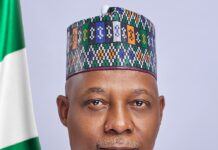By
Idowu Akinlotan
Dec 12, 2021
This is not a review of Bisi Akande’s 559-page autobiography publicly presented last week in Lagos. The time for a comprehensive review may still come. But the book is so controversial and revelatory, holding nothing back, complete with names, dates and details, that it is impossible to ignore the snippets published so far by newspapers to critical and deafening applause. Chief Akande’s autobiography will probably achieve the status of the Nigerian book of the decade. It does not pretend to critical analysis or psychological portraiture of politicians and their actions; it simply recounts what they did and their motivations. It provides backgrounds to political actions and events, and empathetically reviews the reasons some Machiavellian politicians gained the ascendancy and honest others are left holding the short end of the stick. It tears reputations to pieces, exposes and damns many Teflon politicians and leaders, and squirms at the fecklessness and faithlessness of those who offered themselves for leadership in the past one decade or so.
There has been no book like this in the past few decades; and it is doubtful whether there will be another like it, a book by a virtuous and maverick politician who was in the thick of political events since 1999, and one who was unafraid to mention names and dismiss them as callous, inept or indolent. Newspaper snippets cannot do justice to the copiousness and immense sagacity of the book. It has to be read to have a comprehensive grasp of the gates of Dante’s Inferno which Chief Akande has opened. Those excoriated by the book will first catch their breath before responding, and they will either refute Chief Akande’s assertions with facts and figures or hurl invectives at him for his daring and presumptions. The book will be enjoyed for a long time, and the controversies it has stirred will linger for far longer. Among others, President Muhammadu Buhari, who was apparently thought to be a man of his words, is not spared; ex-president Olusegun Obasanjo’s self-righteousness is exploded as a bacchanalian and diabolical myth; Afenifere chieftain Ayo Adebanjo is dismissed as ineffective, sanctimonious and insatiable; and leading progressives are humiliated as feckless, grasping and treacherous. Autobiographies like this are often published posthumously; Chief Akande boldly prefers to sail close to the wind in his lifetime, contemptuous of the contemporary tactics of hiding behind the grave to throw barbs.
The book is just a few days old, and it is not certain yet what assertions will be successfully refuted or sustained. But Nigeria must thank God and the former Osun State governor, who was also the interim chairman of the APC at its founding, for summoning the willpower to write the book and the courage to publish it in his lifetime. The rest, the controversy and the fury, is left to the public to entertain themselves. Coming less than two years to the next general election, one involving a fracturing and fraying APC and an incorrigible and inept Peoples Democratic Party (PDP), there can be no better time and book to offer the country the right cautionary tale as to what political leaders get up to. Many books are read, and both the reader and those mentioned disapprovingly in the book, shrug it off. It is impossible to shrug this one off, no matter how hard anyone tries.
From the snippets so far, it appears Chief Akande is nuanced in his treatment of his subjects. He does not set out to judge anyone by extraneous and theoretical standards; instead he uses his subjects’ statements and actions to assess their political behavior. Thus he gives a massive and revelatory background to how President Buhari as an aspirant broke his word to Bola Tinubu, former Lagos State governor and champion of the APC merger and birth, and even quibbled over the promise to make the latter his running mate, and then excused his behaviour on the grounds of pressures from some northern governors and opinion moulders. Somehow, and unflatteringly, the book presents to the public the essential President Buhari as a man and politician. The president is not dumb or irrational as some think, perhaps on account of whatever ails him in his dotage, but he is vulnerable and superficial. For a leader, that is dangerous. And for a president of a multiethnic and multireligious society, it can be catastrophic. Though the book does not say it, Nigerians will probably glean from the book why it was easy for a cabal to capture the Buhari presidency and lead it by the nose.
President Buhari was the cynosure of all eyes at the book presentation last week. It is not clear whether he had read the book, though he discussed Chief Obasanjo’s kingmaker role in Nigeria with his idiosyncratic truculence. If the president read it before coming to Lagos and still chose not to say a word or two, nay many words, about the almost universal consensus by northern elite, monarchs and Chief Obasanjo to dissuade the APC from fielding him as their standard-bearer, then he is either as implacable as anyone can get or he is simply too contemptuous of his enemies to care a hoot what they felt or knew about him. Chief Akande describes in inspiring details the single-mindedness of Asiwaju Tinubu in enthroning Candidate Buhari, regardless of the general and national opposition to the former head of state’s candidature. It is curious that President Buhari does not feel the urge to say something about why so many key leaders were uninspired by his bid for the presidency. Surely it could not simply be because they embraced corruption. The leaders were simply too horrified to have him mount the throne a second time, after his first baleful sortie in 1983-1985. Events of the past few years, including insecurity to which there is clearly no answer, and the economic chaos afflicting the country to which there is also only shambolic response, may have justified their apprehensions.
There will be many top politicians, ethnic champions and opinion leaders who will be responding to Chief Akande’s book in the coming weeks, once they catch their breath and can moderate their resentment. But they will have a hard time convincing the public that they have been mischaracterised in the book. For instance, Chief Akande suggests that Afenifere leaders were grasping and importuning; the nonagenarian Chief Adebanjo will respond on their behalf and try to put the lie to any suspicion that someone else other than himself built the house he is living in in Lekki, a Lagos suburb and new development area. He will, however, have no response to his being characterised as a middling, eternally flawed politician who could never hope to win an election even in his heyday.
Since the book is not exactly analytical, it is unable to interrogate the manoeuvres around the repudiation of Asiwaju Tinubu as Candidate Buhari’s running mate. Given the intensity of the pressures brought to bear upon the APC standard-bearer, not to say the flattering character portrait of the former Lagos governor as a large-hearted, tactical, generous and hard working politician, Candidate Buhari probably succumbed to pressures that had nothing or little to do with the Muslim-Muslim bogeyman ticket sold by some politicians to the gullible. Those who finally convinced Candidate Buhari to eat his words painted for him a picture of a running mate who would dominate and drive the presidency with strategic and modernising thinking. Should he run with Candidate Buhari and win, no cabal could seize control of the presidency; but if they did, they would make life miserable for the former Lagos governor. The definitive manner Candidate Buhari repudiated the gentleman’s agreement he had with Asiwaju Tinubu had little to do with the religious colour of the ticket; it was bigger than that, more futuristic, and as the former Lagos governor himself said, had something to do with an agenda he could not at the time put his finger on. Four years into the Buhari presidency, there is now no illusion what that agenda was. Asiwaju Tinubu is fortunate to have been muscled out, and largely left alone. The alternative would have been too grim to contemplate.
Chief Akande’s book will sell by the thousands. He has done posterity a good turn by documenting his experience and observations in politics. Many will hate him in his twilight years, but many more will be eternally grateful that he did not take his observations to the grave. In the grave, and without the book, he would have found it hard to rest without lifting the burdens off his chest. That he did so, regardless of the controversy and attacks the book will elicit, is a credit to his person, unique and incomparable character, and experience. Let him now sit back and wait for the barbs. They will more or less bounce off him like feathers. He does not need to say anything more; it is up to the offended to write their own books or doctor history with their characteristic reluctance to honour the truth.






